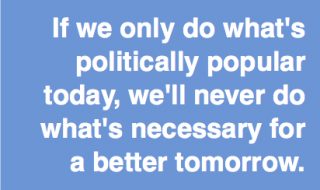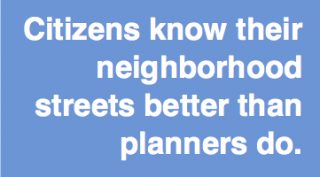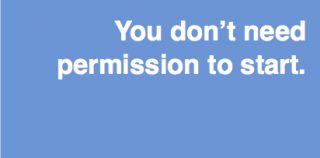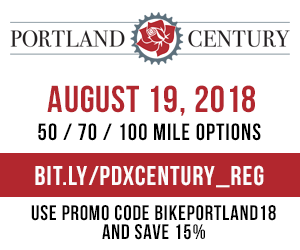
Throwing bales of hay onto one of Portland’s most dangerous, high-speed arterials is far from reasonable. And that’s probably why it was so effective.
(Photo: Jonathan Maus)
Catie Gould is co-editor of our Adventures in Activism column.
There are not many professions where you introduce yourself and get a stream of complaints in response. I design office printers for a living, so this comes up a lot. On the plus side, years of complaints about ink prices and paper jams prepared me well to have an opinion about transportation issues, and be ready for other people’s advice on what is wrong with my perspective.
Just wearing a Sunday Parkways shirt once got me on the receiving end on a stream of complaints about PBOT, bike racks, and so on.
In general, I think transportation is a wonderful advocacy area because it is so accessible. Everyone experiences it — and therefore everyone is an expert. Well, not really. But everyone who calls City Hall about the lack of parking considers themselves experts, so you might as well think of yourself as one too.
To “advocate” is a verb. It requires you to occasionally stand up in front of other smart people and give voice to the politically unpopular topic that no one else wants to bring up. When you do that, people often try to talk you out of it. Here are some of the responses I’ve heard. After reading through them, I hereby grant you permission to let them roll right off you so you can get back to work.
“I just want advocates to be reasonable”
Having a futuristic mindset and seeing what could be possible often doesn’t jibe with the reality on the ground today. And that’s OK. Some people have bigger imaginations than others. Leonardo da Vinci was working on his helicopter design four hundred years before a helicopter actually came into being.
What people often mean by this phrase is, “The current city council will likely not approve it” or “This will generate a lot of NIMBY complaints” or “We need to take smaller incremental steps first before we put that idea on the table.” It’s totally acceptable for people to think this way. After all, compromises make ideas turn into reality. But as an activist, that’s not my job. My job is to inspire and hold decision-makers accountable.
And what exactly is reasonable these days? Especially with a current reality that includes these inconvenient truths:
- In the 110 years since humans invented plastic, garbage has been accumulating in the ocean at exponential rates, the largest “patch” is now four times larger than California.
- According to the latest data, Oregon is not on track to meet its greenhouse gas emissions goals, and we are increasing our emissions.
- 37,461 people died in traffic in 2016.
- By 2060, 1.4 Billion people are estimated to become climate refugees. That is 1 in every 5 people alive today.
The idea that we can’t change big things is generally preposterous. Most of what we need to change was just built in the last hundred or fifty years.
Traffic is a much more tangible problem to people than climate change. That’s where we — transportation reformers — can come in and remind people about the big picture. We say out loud that we are not on track to meet our goals for 2030 or 2035 or 2050. We say that both option A and option B are bad compromises and half measures and we want option C instead. That if we only do what’s politically popular today, we’ll never do what’s necessary for a better tomorrow.
We live in a pivotal moment in the world, and we can’t wait for the right political season to bring up hard topics. Other people can make those compromises. Even when you yourself are OK with compromise, it’s still important to draw attention to what the compromise is and what the best solution could be.
Tl;dr: It can take years for ideas to grow into policies, so don’t wait to ask for what you want.
“Don’t the transportation engineers know best?”
Invoke WWJD here. What Would Jane Do.
If the professionals had everything covered then we wouldn’t be here right now. We’d all be sipping margaritas by the Willamette, breathing our non-diesel filled air without the hum of a freeway over our heads. City planning ideals have changed over the last fifty years thanks to great advocates like Jane Jacobs who was not a professionally trained urban planner. She was a journalist who loved her city.
Citizens know their neighborhood streets better than planners do. When planners come to your neighborhood for a project, you play a vital role in educating them about what’s going on day-to-day. People know what intersections feel unsafe, a close call you saw once, common bike routes that people use that are not on a map. It can be as simple as saying at an open house: “This landscaping looks great, but its right where I want to walk,” or “This is a shortcut I use because the crossing to the official bike path is unsafe.” No amount of education can substitute the intimate lived experience that you have with your local streets. In addition, there are a wealth of free resources, like StreetMix or webinars through TREC or NACTO if you want to learn the lingo.
Trust me, at some point you’ll be disappointed with a proposal. You can see that the design emulates some of the things you really dislike in other infrastructure. A path is too curvy instead of straight. The project might not adhere to the latest policies (Foster Street, I’m looking at you). Bring it up. Disguise your criticism with a question like, “How will this project advance our climate action plan?” Stand up and say you are worried we are missing a bigger opportunity. Other people will notice — and they might even clap because you said the thing no one else had the guts to say. Then be exceedingly nice after the meeting and offer to discuss more over an adult beverage. Do not skip this step.
“You should be strategically aligned with *insert multiple non-profits here* and then we could actually make some progress”
Just hearing this comment makes me tired. So tired. It conjures up images of meetings and vision statements and advisory committees. I actually love meetings. I plan my week around them. Really great things happen at the intersections of organizations when smart, civically-minded people meet each other and talk about ideas.
But you don’t need permission to start. Those kind of worries will make you hesitate to begin, and ultimately, slow you down. Great ideas will attract supporters. But not every project or strategy needs to be agreed upon by a coalition. Everyone thinks their issue is the most important one, and may even have a study to prove it, but it is more alienating than productive to say so. There is so much out there that needs fixing. The “most important” issue you should be working on is the one that pulls at your heartstrings and makes you want to bail on your dinner plans to go to a public meeting instead.
A diversity of tactics helps us move forward. When I started falling in love with transportation I went to meetings of different groups until I found one that was a good fit for me. There is room for more organizations and more people. At the worst, we end up playing a public “bad cop, good cop” where we disagree. That’s not the worst outcome. We’re all working towards a better future, and we need all hands on deck.
Back to printers…
It’s likely that every issue you’ve had with a printer was noticed by someone during the development process. There are a million reasons why it might not have been fixed: Someone had a long day and assumed the error was their fault; They didn’t want to break bad news to their boss; The launch schedule had already been delayed twice; They aren’t sure of exactly what happened and don’t have time to investigate; The last time they brought up an issue it created a lot of stress for the team.
But customers will be grateful that someone stuck out their neck and spoke up, just like the next generation of Portlanders will be glad that you spoke up for a better future. So the next time someone gives you some of this well-meaning yet dismissive advice, send them a link to the next public comment period and help them get engaged in a project they care about.
— Catie Gould, @Citizen_Cate on Twitter
Never miss a story. Sign-up for the daily BP Headlines email.
BikePortland needs your support.
The post “Be reasonable” and other advice aspiring activists should ignore appeared first on BikePortland.org.
from Latest headlines from BikePortland https://ift.tt/2NZ5Tvq




No comments:
Post a Comment